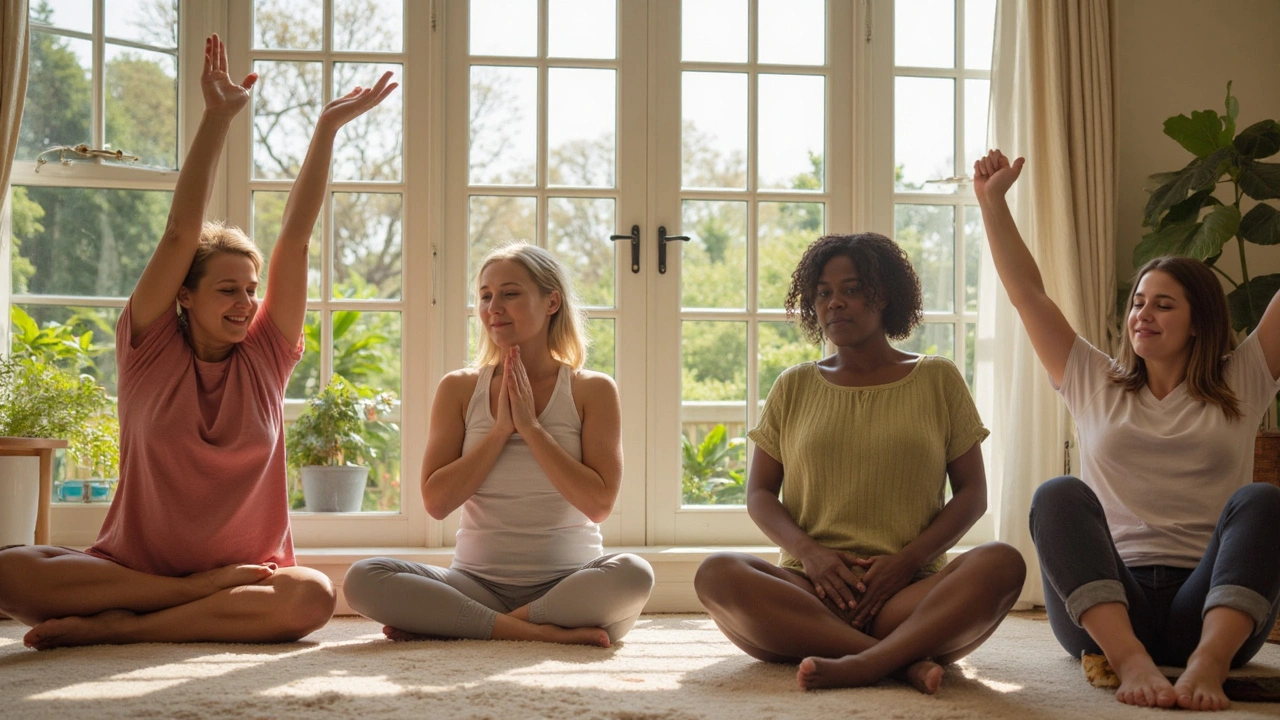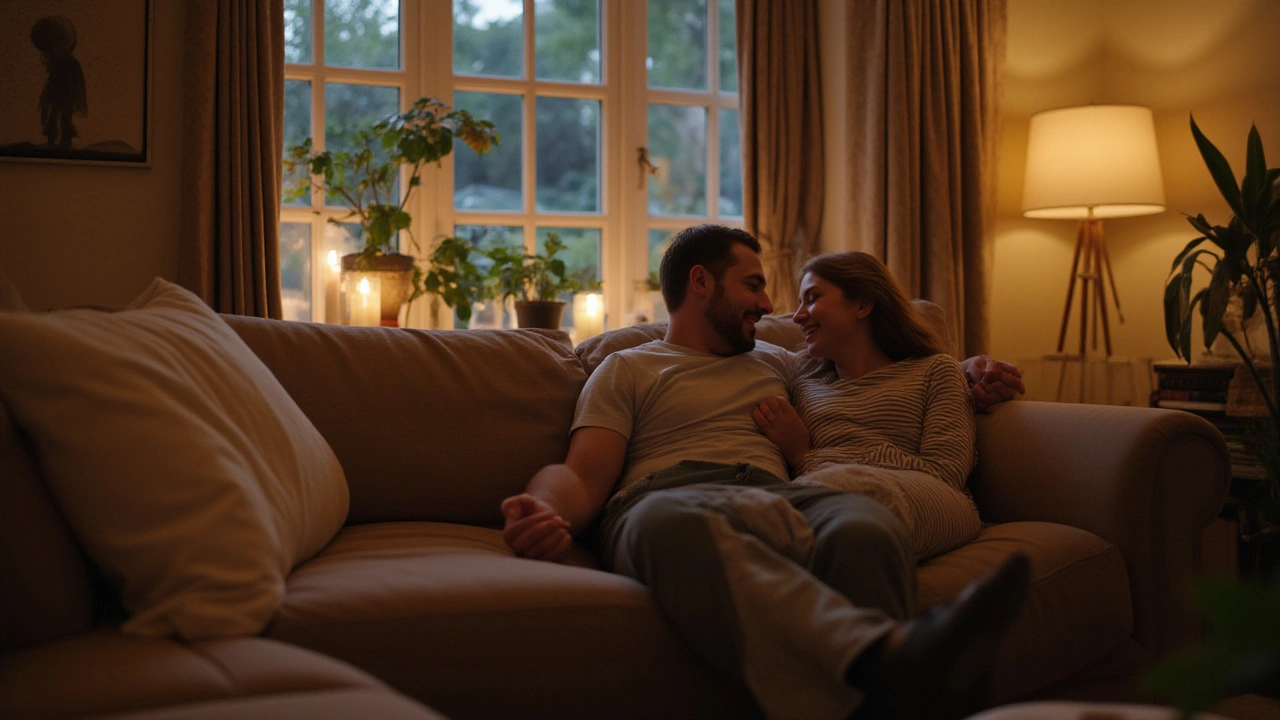Full Body Massage and Mental Health: Unlocking the Mind-Body Connection

Imagine lying on a massage table, your mind racing from the day's stress, and suddenly, warmth and calm flood your body. Most people think the perks of full body massage start and end with relaxing sore muscles or unknotting stiff shoulders. But the real magic goes far deeper—right into your brain and your mood. Recent studies have shown that what happens to your muscles during a proper full body massage doesn’t stay there; it echoes through your nervous system, shifting how you feel, think, and even perceive stress. If you’re picturing incense, gongs, and ‘just relaxing’, well, that's the light version. The true story of how your mind and body are tangled is a lot more fascinating—and practical—than that.
How Stress Physically Sticks With Us
Stress isn’t just a fog in your head; it’s something your body holds onto—tight shoulders, clenched jaws, never-ending fidgeting. The body runs on a network called the autonomic nervous system, which controls those fight-or-flight (sympathetic) and rest-and-digest (parasympathetic) responses. Chronic stress overloads the fight-or-flight side, leaving you in a constant alert mode. People in the UK, according to data from the Mental Health Foundation in 2024, report physical symptoms of stress more than anywhere else in Europe—think headaches, stomach issues, even chest pain, not just worrying thoughts.
The body literally hardwires this tension into muscle memory. That’s why, after tough weeks, your shoulders creep towards your ears. Traditional medicine used to brush off this process, but MRI studies from the University of Sheffield have tracked changes in brain activity before and after massage. Turns out, areas linked with anxiety shrink in activity post-massage, showing it’s not just your mood changing but your brain itself adjusting. These changes stick for days, sometimes weeks, making full body massage a low-tech but powerful tool for shifting how stress manifests.
Massage isn’t magic, but it makes a noticeable dent in stress hormone levels. After just 60 minutes of a Swedish or deep tissue session, salivary cortisol (that’s the stress hormone) drops by almost 30%. That’s a measurable, chemistry-backed change. Blood pressure follows, dropping by 10-12 mmHg in people with hypertension. If you ever wondered why those regulars at your local Bristol massage parlour always look so radiant, it’s because their nervous systems are getting a needed reset. Even mental health charities now recommend massage as a support tool for stress management, alongside talking therapies and mindfulness.
So, when life turns up the heat, it’s not only your mind that gets frazzled—your body bears the brunt in its own sneaky ways, wiring tension into your tissues. This is where massage sneaks in and starts unwinding the knot directly at the source.
The Chemistry of Touch: What Massage Does to the Brain
Here’s something wild. Every time a skilled therapist puts their hands on your muscles, your skin fires off messages to your brain. There's more happening than you can feel. Gentle pressure activates the vagus nerve, a key player in turning off stress responses and ramping up relaxation. That nerve literally runs from your brainstem right through to your gut—think of it as the body’s peacekeeper. In one experiment at King’s College London, volunteers receiving full body massage saw almost double the baseline activity in their vagus nerves compared to controls. That’s like flipping a switch from 'wound up' to 'chilled out.'
But the real buzz happens with hormones. Oxytocin, nicknamed the 'cuddle hormone', spikes during and after massage. This isn’t just some fluffy feel-good hit; oxytocin repairs trust, social bonds, and helps curb the effects of loneliness. For anyone dealing with burnout or living miles away from loved ones, touch is a physical way to reconnect—even briefly—with a feeling of safety and support. No app or meditation track does this so directly.
Dopamine and serotonin, the big hitters for mood, also get a post-massage boost. This surge lingers, especially for people who commit to regular full body sessions. A 2023 paper published in the British Journal of Psychiatry found that patients with mild depression who added weekly massage saw mood improvements on par with those starting an exercise routine. That’s serious impact, especially if you’re the type who struggles to drag yourself to the gym. Even people with anxiety disorders measured lower heart rates and slower breathing after just one session, proof that the effects aren’t wishful thinking.
One tip—if you’ve hit a rough patch, try pairing full body massage with aromatherapy. Essential oils like lavender or bergamot can amplify the calming neurochemical cascade. Massage therapists now use this combination in clinics across the UK, and some GPs actually recommend it for insomnia.
So, next time you book a session, remember: it’s not just about blissed-out muscles. Every stroke and squeeze creates a surge of brain chemicals designed to carry you through stormy weeks.

Why Full Body Massage Works Better Than Targeted Treatments
A lot of folks in Bristol swear by quick back rubs or chair massages for instant relief at lunch. Sure, they help, but full body massage offers something different—a bigger mental shift. When the therapist covers your whole body, you get a systemic reset, not just spot relief. There’s science behind this, too. In 2022, Manchester Metropolitan University ran a study with office workers. Those who had full body sessions twice a month recorded bigger drops in anxiety and stress scores than those who stuck to 20-minute neck and shoulder treatments. The reason? It’s all about global nervous system activation. When the body gets attention from head to toe, the brain stops hyper-focusing on 'problem' areas, breaking the feedback loop between pain, worry, and tension.
Think about the last time you tried to switch off but your restless legs wouldn’t quit. Localised massages skip over places you may not notice are tense—hips, calves, forearms, even the scalp. Full body approaches force you to let go, bit by bit, until everything softens, including your mind. For long-term mental health gains, consistency is key. Therapists recommend at least monthly sessions for most adults. If cost is an issue, seek community clinics or student offers—sometimes available for under £25 for a full body session.
Massage therapists use techniques like Swedish strokes for overall calm, plus deeper work on spots holding stubborn stress. Mixing it up keeps the mind guessing and avoids boredom—another psychological win. Some therapists blend Thai stretching, which has been linked (in a 2023 study from Chulalongkorn University) to not only increased flexibility, but marked drops in depression symptoms for long-term recipients.
If you’re ever tempted to ask for “just a neck rub,” try treating your whole system instead. The results go way beyond muscle relief; it’s about finding a deeper quiet that lingers long after you leave the studio.
Tips for Maximizing the Mind-Body Benefits of Massage
Want to get the most from your next massage? Here are a few strategies that work especially well:
- full body massage When booking, ask to include hands, feet, scalp, and limbs—not just back or shoulders. People often carry tension in hands and feet without realising, and releasing these areas can trigger whole-body relaxation.
- Communicate. Let your therapist know about your mood, not just injuries. Want to improve your sleep? Feeling anxious? They can adapt massage style and pace for your mental state.
- Schedule wisely. Slot your session at the end of a rough week or just before a stressful event. The benefits stack up if you time them with your emotional ups and downs.
- Breathe slow. Focus on long exhalations while on the table; this amplifies the vagus nerve stimulation and deepens the mind-body calm.
- Limit screen time after. Give your brain a digital detox post-massage to help the chemical changes settle (your inbox will wait).
- Build a routine. Just like going for a jog, results snowball when you do it regularly. Even bimonthly sessions can buffer against stress overload and bad patches.
- Pair with other wellness practices. Mindfulness, gentle yoga, or walking right after a massage can double down on the relaxing effects.
- Don’t rush out. Give yourself 10-15 minutes to sit or walk after, letting your nervous system adjust—no dashing straight back into noisy streets or meetings.
Even if you can’t book a professional session, self-massage can boost mental health as well. Simple neck squeezes, rolling your feet over a tennis ball, or swapping shoulder rubs with a mate all activate similar brain chemistry. The key is regular, mindful touch in some form.
Last fact to drop at your next dinner party: Britain’s NHS now includes massage therapy in several pilot programs for mental health—especially for people battling chronic anxiety. The science keeps mounting, but the best evidence is how you feel the next day: lighter, calmer, clearer—like your mind just had a holiday.




Steve Wilson
August 7, 2025 AT 20:30I really appreciate the focus on the mind-body connection here. It’s incredible how a full body massage doesn’t just soothe muscles but actively helps in reducing stress and anxiety levels.
Many studies suggest that massage therapy increases serotonin and dopamine — key neurotransmitters that stabilize mood. That’s why even a single session can feel like a reset button for your mental well-being.
Plus, it’s a natural alternative to medication with no side effects. I think more people should consider regular massage as part of their mental health regimen, especially in today’s stressful world.
Simple lifestyle incorporations like this can really improve quality of life. Has anyone here tried integrating massage therapy into their routine and noticed significant mental health benefits?
Jessica Horcher
August 7, 2025 AT 21:30Absolutely agree. There is a well-documented science behind massage therapy’s impact on reducing cortisol — the stress hormone — and promoting relaxation through the parasympathetic nervous system.
It’s important to highlight practical tips as well, like choosing a licensed therapist, creating a calm environment, and even self-massage techniques at home to maintain benefits.
This post does a great job laying down these aspects clearly and concisely, making the information accessible without overwhelming technical jargon.
Anyone looking to improve their mental health holistically would benefit from this insightful content. Would also recommend exploring complementary practices like meditation for a stronger mind-body balance.
Vishal saini
August 7, 2025 AT 22:53From a more technical perspective, it’s notable how massage stimulates the vagus nerve, which in turn regulates heart rate and promotes calmness. This mechanism provides a physiological explanation for the calming effects on mental health.
Clinicians increasingly acknowledge body work as adjunct therapy for depression and PTSD. So combining full body massage with psychological support could be powerful.
I also appreciate the mention of actionable tips. Often discussions remain theoretical without practical guidance, which limits real-world application.
Has anyone encountered specific massage techniques or oils that enhance mental health outcomes? Sharing such details can enrich this conversation.
William Sogus
August 8, 2025 AT 01:06Alright, before y’all get too cozy with this massage hype, let’s not forget the darker side here. They conveniently skip how these wellness trends sometimes mask the very systemic issues causing mental struggles.
Yes, massage can relax muscles, but what about actual socioeconomic stressors? The mind-body connection is exploited to make you think a session on a table fixes deep-rooted problems.
Also, is anyone tracking how much of these supposedly 'science-backed' facts come from self-serving wellness companies? Skepticism is healthy folks.
We should instead demand broader mental health reforms rather than relying solely on surface-level pampering.
Kayla Hochard
August 8, 2025 AT 01:40Wow, here we go again with the typical brainwashed nonsense about massages magically curing your mental health! Just because some fluff piece says it, doesn’t mean you toss actual medical advice and real therapy out the window.
Real healing comes from discipline, accountability, and facing facts head on—not from laying back and getting rubbed down like some lost puppy seeking attention.
These feel-good trends pave the way for weakness, undermining the strong work ethic our nation was built on.
Yeah, sure, massages might make you temporarily feel good, but don’t confuse that with real mental strength or solving your problems.
We need to grow some backbone instead of indulging in this wishy-washy touchy-feely stuff.
Kelsey Stratton
August 8, 2025 AT 02:13Honestly, I’m just here for the chill vibes massages provide. It’s not always about fixing or deep scientific reasoning—sometimes it’s just nice to feel calm and relaxed.
Certainly helps me clear my head after a rough day. The body and mind are connected in ways that aren’t all measured by fancy studies.
Even the simplest act of taking care of oneself physically can boost mood, even if it’s placebo or not, it works.
Would recommend anyone skeptical to just try it out. If it helps even a little, that’s what matters.
Ariel Lauren
August 8, 2025 AT 03:20Thank you all for your insightful responses! I’m glad to see a variety of perspectives here, ranging from the enthusiasm about scientific evidence to skepticism about overreliance on massages alone.
Indeed, massage therapy is not a cure-all but rather a valuable complementary approach within a holistic mental health strategy.
For those interested, I’ll be updating the post soon with recommended certified therapists and techniques proven to maximize both physical and mental benefits.
Meanwhile, please continue sharing your experiences and questions; it helps us all better understand this compelling mind-body dynamic.
Andre Estrela
August 25, 2025 AT 19:10yo this thread got wild fast lol 😆😆 seriously tho, massages 👐 are life... like when ur stressed af and just wanna melt into the table nice and smooth... it’s magic 💫
science or not, nothing beats that warm hands vibe and the peace it brings to the brain.
100% agree with keeping it part of your self care routine. it’s an epic way to hit pause on crazy days.
who else has a fav type? i’m team deep tissue all the way 🙌
prajesh varma
September 6, 2025 AT 08:56Mate, massages ain’t just some fluff thing! It’s bloody essential sometimes to disconnect the chaotic mind and let your body breathe.
There’s a sea of stress, deadlines, and digital madness that drags the brain through a warzone daily.
Full body massage acts like a killer detox, flushing out mental muck and recharging the soul power.
In India, traditional massages go way back centuries with everything entwined with yoga and meditation—the trifecta of peace.
If you haven’t tried it yet, trust me you’re missing a vital key to mental clarity and emotional resilience.
Sean Marcus
September 6, 2025 AT 17:16I get why people dig massaging to chill, but sometimes it feels like an excuse for folks to avoid real problems, you know? Like, just rub it out and forget the world’s crap for a bit.
It’s a decent distraction, but don’t fool yourself thinking that’s enough when deep issues are staring you down.
Still, I’ll admit a good session can mess with your head—in a good way—and maybe give you the energy to face things.
Just don’t overdo the happy touchy-feely vibe to the point where you ignore the shitty parts of reality.